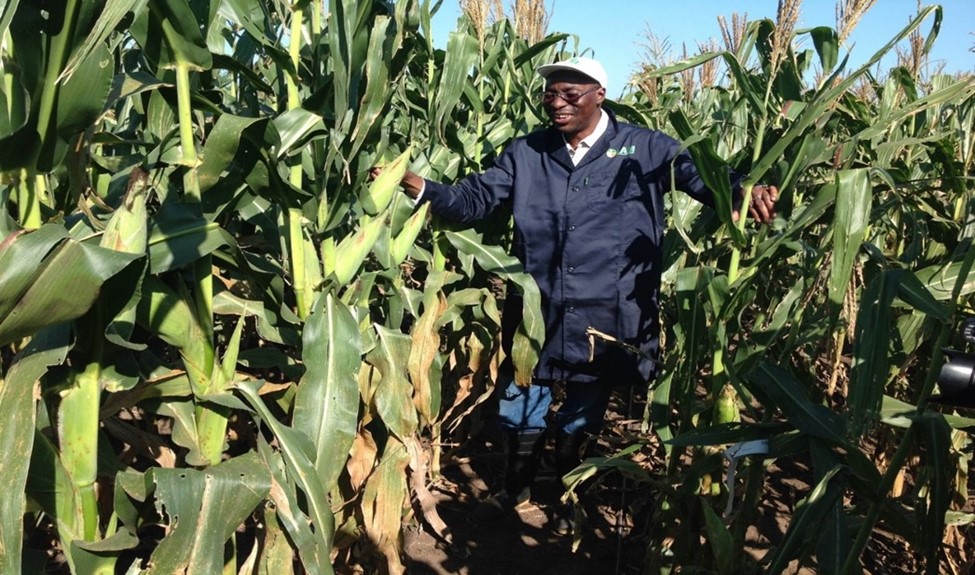
(Nairobi, Kenya, May 2024): Scientists across three African countries have inched closer to the development and release of maize varieties that would significantly enable farmers in the region to confront droughts and reduced water availability, challenges brought about by climate change.
A comprehensive study conducted by AATF and partners across Kenya, Uganda, and South Africa for six years has showcased desirable traits and efficacy of the drought-tolerant gene MON 87460 in maize hybrids aggregated across the countries.
The study evaluated a wide range of maize hybrids tested on various water stress levels and demonstrated that some of hybrids containing the MON 87460 drought resistance gene (traited hybrids) consistently outperformed those hybrids that did not contain the gene (non-traited) by 36 to 62 percentage in one of the locations.
The MON 87460 also known as DroughtGard® is a drought-resistant maize hybrid variety using recombinant DNA technology to introduce Cold Shock Proteins B (cspB) which are small proteins that bind to nucleic acids and are found in bacteria, plants, and animals.
This study evaluated the efficacy of the DroughtGard® gene in more than 120 conventional drought-tolerant maize hybrids in the three countries under managed drought stress and optimal conditions. It also sought to establish any additional yield contribution or yield losses of the gene in traited hybrid varieties relative to their non-traited hybrid varieties.
Efficacy or the maximum response that can be achieved with the MON 8760 gene under the various drought stress levels showed that the MON 87460 traited hybrids had significantly higher yield under high-to-severe stress compared to low‐ to moderate-stress levels.
“These findings underscore the comprehensive nature of our research and the pivotal role of the MON 87460 gene in enhancing maize resilience to drought,” said Dr. Caleb O. Obunyali, lead researcher of the study. “Our results confirm the significant yield advantage of hybrid varieties with the MON 87460 gene, particularly under high-stress conditions.”
The results provided by this multiple agro-ecological study provide insights into various promising scientific interventions for climate adaptation available for African farmers.
“The comprehensive evaluation of maize hybrids across diverse agroecologies and over multiple years provides robust evidence of the effectiveness of the MON 87460 gene,” added Dr Obunyali. “This research sets a new standard for understanding and harnessing the potential of drought resistance genes in maize breeding programs in Africa.”
There was a yield increase of up to a fifth between hybrids containing the DroughtGard® gene and ordinary drought-tolerant hybrid versions in 10% of the total hybrids evaluated across years, countries, and locations.
Various countries in Africa have been independently testing the efficiency and effectiveness of various drought-tolerant varieties both developed using conventional advanced breeding techniques as well as genetic engineering or transgenic technology. AATF and partners have over the years tested and released several maize hybrid varieties known as DroughtTEGO® and TELA® under the Water Efficient Maize for Africa and TELA Maize Project.
This study showed that if MON 87460 transgene is deregulated for open cultivation in Africa and used to develop drought‐tolerant hybrid varieties, it can effectively improve drought tolerance in maize and cushion farmers against yield loss due to frequent drought events caused by climate change.
########
About AATF (www.aatf-africa.org)
Founded in 2003 to address Africa’s food security prospects through agricultural technology, AATF believes that the agricultural sector is a key foundational pillar as Africa consolidates its economic growth and carves out its new position as a major global economic powerhouse and the next growth market in the world. It was formed in response to the need for an effective mechanism that would facilitate and support negotiation for technology access and delivery and the formation of appropriate partnerships to manage the development and deployment of innovative technologies for use by smallholder farmers in Sub-Saharan Africa.
For more information contact: George Achia, Communications Officer, East and Southern Africa, AATF; g.achia@aatf-africa.org +254 785334163


















































































